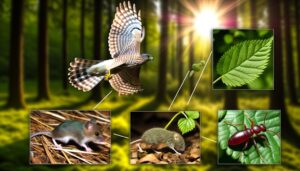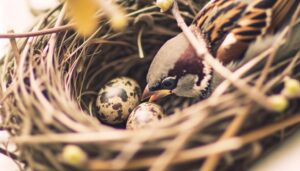5 Tips That Will Help a Fledgling Sparrow Not Eat
A fledgling sparrow's refusal to eat can stem from various causes such as illness, stress, or improper feeding techniques. Signs of illness may include lethargy, fluffed feathers, and decreased vocalization.
Make sure the environment is stress-free, with ideal temperatures (85-90°F) and minimal noise. Proper feeding techniques involve hand-feeding tools and the correct feeding posture.
Suitable food choices include mealworms, insect larvae, and small seeds. Hydration with oral rehydration solutions may also be necessary.
If refusal persists, consult a licensed professional for further evaluation and intervention. Understanding these factors can greatly aid in addressing the issue effectively.
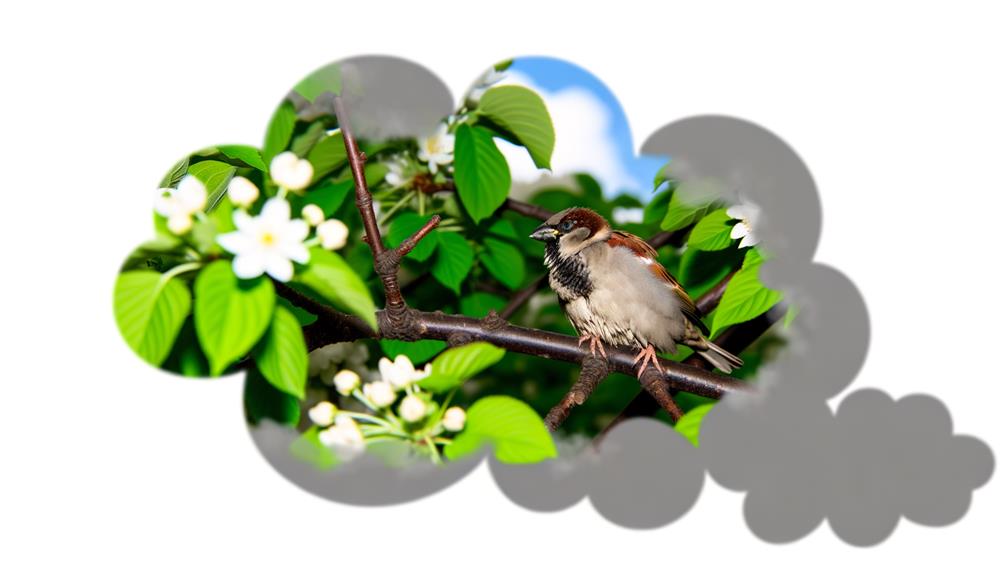
Key Takeaways
- Assess for illness symptoms like lethargy, fluffed feathers, or discharge from eyes or beak.
- Ensure the environment is stress-free, quiet, and maintains an optimal temperature range of 85-90°F.
- Use proper feeding techniques, including hand-feeding tools and correct posture, to reduce feeding stress.
- Offer suitable food choices like mealworms, insect larvae, and small seeds rich in proteins, fats, carbohydrates, vitamins, and minerals.
- Seek professional help if the fledgling exhibits abnormal respiratory patterns or prolonged refusal to eat.
Common Reasons for Refusal
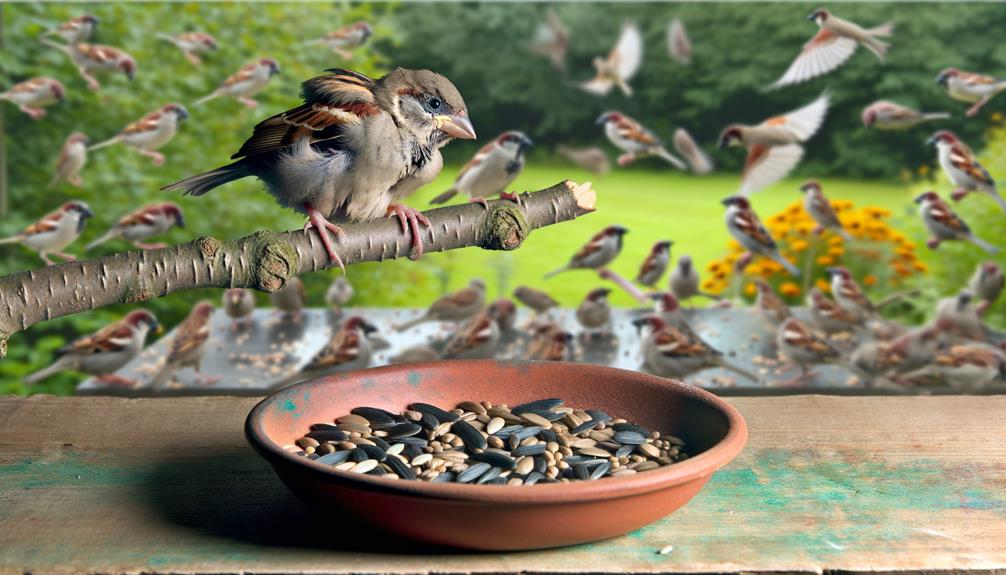
Refusal to eat in fledgling sparrows can often be attributed to factors such as illness, stress, improper feeding techniques, or unsuitable dietary choices. These birds are highly sensitive and their refusal to eat may indicate underlying health issues or environmental stressors.
Improper feeding techniques, such as incorrect timing or method, can also deter feeding. Additionally, fledgling sparrows require a specific diet; deviations can lead to dietary imbalances and subsequent refusal to eat. Analysis of these factors necessitates a meticulous approach to identify and rectify the root cause.
Understanding the interplay between these variables is essential for ensuring the health and well-being of fledgling sparrows, thereby promoting their successful development and adaptation to their natural habitat.
Recognizing Signs of Illness
Identifying illness in a fledgling sparrow requires careful observation of both behavioral changes and physical symptoms. Key behavioral indicators include:
- Lethargy
- Decreased vocalization
- Reluctance to fly
Physically, look for signs such as:
- Fluffed feathers
- Discharge from eyes or beak
- Irregular droppings.
Behavioral Changes Noted
Observing a fledgling sparrow's behavioral changes is essential for recognizing early signs of illness. Key indicators include lethargy, reduced vocalization, and decreased responsiveness to stimuli.
A healthy fledgling typically exhibits high activity levels, frequent chirping, and alertness. Conversely, an ill bird may isolate itself, show reluctance to engage in typical exploratory behaviors, or exhibit excessive sleepiness. Another critical sign is a diminished interest in preening, which could lead to disheveled feathers.
Behavioral monitoring should be systematic and include notes on frequency, duration, and intensity of these changes. Timely recognition of these symptoms enables early intervention, potentially preventing further deterioration. Understanding these behavioral cues can significantly impact the bird's prognosis and overall wellbeing.
Physical Symptoms Observed
Manifestations of physical illness in a fledgling sparrow often include visible signs such as fluffed-up feathers, labored breathing, and noticeable weight loss. Recognizing these symptoms promptly is vital for timely intervention.
Key physical indicators of illness may also encompass:
- Reduced Activity: A lethargic or unusually inactive sparrow may signal underlying health issues.
- Discharge: Presence of nasal or ocular discharge often indicates respiratory infections.
- Abnormal Droppings: Changes in the consistency, color, or frequency of droppings can be indicative of digestive problems.
Observing these physical symptoms alongside behavioral changes provides a thorough understanding of the bird's health. Prompt veterinary consultation is advised to diagnose and treat potential illnesses effectively, ensuring the fledgling's chance for recovery and normal development.
Assessing the Environment

To accurately determine the reasons behind a fledgling sparrow's refusal to eat, it is necessary to meticulously evaluate the bird's immediate surroundings, including temperature, noise levels, and potential sources of stress. Best temperature for fledglings should be maintained between 85-90°F, as deviations can affect their metabolism and appetite.
Excessive noise can induce anxiety, inhibiting feeding behavior. Evaluate the enclosure for potential stressors such as predatory pets or high human activity, which can create a hostile environment. The presence of harmful substances or inappropriate perches may also contribute to discomfort, deterring the bird from eating.
Ensuring a serene, stable, and appropriately warm environment is important for encouraging normal feeding patterns and supporting the overall health of the fledgling sparrow.
Proper Feeding Techniques
Maintaining a serene environment is the first step, but understanding and implementing proper feeding techniques is equally critical for guaranteeing the fledgling sparrow's nutritional intake. The correct technique involves a meticulous approach to encourage feeding without causing distress.
Key methods include:
- Hand-Feeding Tools: Utilize specialized syringes or pipettes to control the volume and delivery speed of food.
- Feeding Posture: Position the fledgling in a natural, upright stance to facilitate swallowing and minimize aspiration risks.
- Feeding Frequency: Offer small, frequent meals to mimic natural feeding patterns and prevent overloading the young bird's digestive system.
Adhering to these techniques guarantees the fledgling receives adequate nutrition while reducing stress, promoting a smoother shift to independent feeding.
Suitable Food Choices
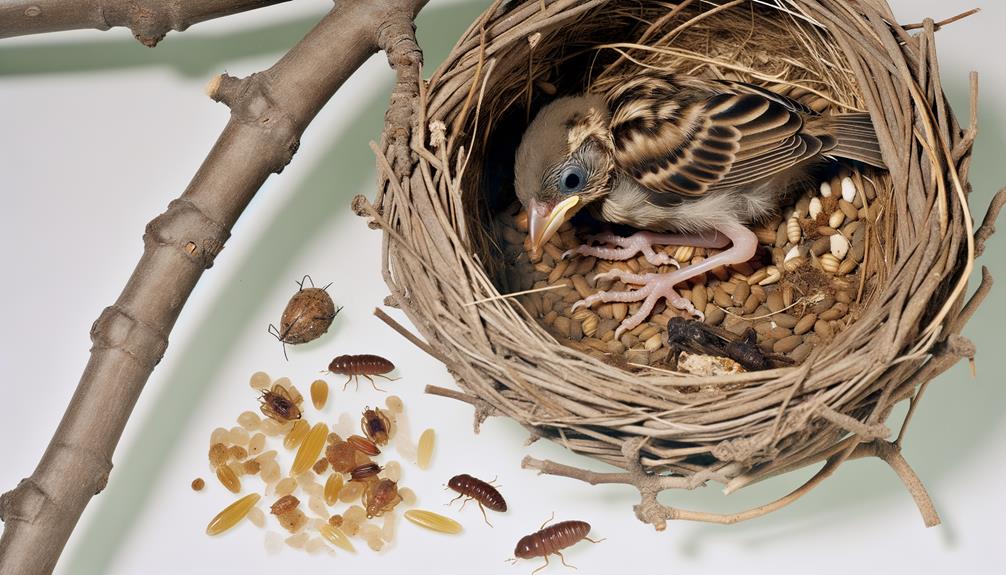
Selecting appropriate food choices is essential for ensuring the fledgling sparrow's growth and development. Best nutrition includes a balanced intake of proteins, fats, and carbohydrates. High-protein foods such as mealworms and insect larvae are vital for muscle development. Small seeds and grains provide necessary carbohydrates for energy. Additionally, ensuring the right mix of vitamins and minerals is crucial for overall health.
| Food Type | Nutritional Benefit |
|---|---|
| Mealworms | Abundant in protein for muscle growth |
| Insect Larvae | Rich in essential fats and proteins |
| Small Seeds | Source of carbohydrates and energy |
Each food type must be presented in a way that encourages consumption, considering the fledgling's initial reluctance to eat.
Hydration Importance
Hydration is critical for the fledgling sparrow's overall health and recovery, especially when it is not consuming food. Proper fluid intake must be guaranteed to prevent dehydration, which can be identified by signs such as lethargy, sunken eyes, and dry mucous membranes.
Implementing effective hydration methods, including the use of electrolyte solutions and careful administration techniques, is essential for its well-being.
Ensuring Proper Fluid Intake
Proper fluid intake is crucial for the health and survival of a fledgling sparrow, as dehydration can worsen their reluctance to eat. Securing sufficient hydration involves several critical steps that are vital for maintaining the bird's physiological balance.
- Administering Electrolyte Solutions: Use avian-specific electrolyte solutions to replenish necessary minerals and fluids.
- Monitoring Fluid Consumption: Track the volume of fluids ingested to secure they meet the hydration needs of the fledgling.
- Using Appropriate Delivery Methods: Employ droppers or syringes for precise administration of fluids, minimizing stress and potential aspiration.
Signs of Dehydration
Recognizing the signs of dehydration is essential to address the fledgling sparrow's reluctance to eat effectively. Dehydration can manifest through various physiological symptoms, impacting the bird's overall health and willingness to consume food. Key indicators include sunken eyes, lethargy, and dry mucous membranes. An analytical approach to monitoring these signs guarantees timely intervention and improves chances of recovery.
| Symptom | Description | Impact on Sparrow |
|---|---|---|
| Sunken Eyes | Eyes appear recessed | Indicates severe dehydration |
| Lethargy | Reduced activity and alertness | May lead to further health decline |
| Dry Mucous Membranes | Lack of moisture in beak and eyes | Hinders proper feeding and hydration |
Understanding these signs is essential for timely and effective treatment.
Hydration Methods Explained
Effective rehydration techniques are vital for ensuring the fledgling sparrow's survival and recovery. Dehydration can exacerbate existing health issues and hinder the bird's ability to regain strength. It is essential to utilize precise methods to administer fluids effectively.
Key methods include:
- Oral Rehydration: Administering a balanced electrolyte solution via a syringe or dropper.
- Subcutaneous Fluids: Injecting sterile fluids beneath the skin, a technique requiring veterinary expertise.
- Soaked Foods: Offering water-soaked foods to indirectly increase fluid intake.
Each method addresses the nuanced hydration needs of a fledgling sparrow.
Oral rehydration is typically the least invasive and most accessible.
Subcutaneous fluids are reserved for severe cases under professional guidance.
Soaked foods serve as an adjunct method, particularly for sparrows resistant to direct fluid administration.
Stress Factors
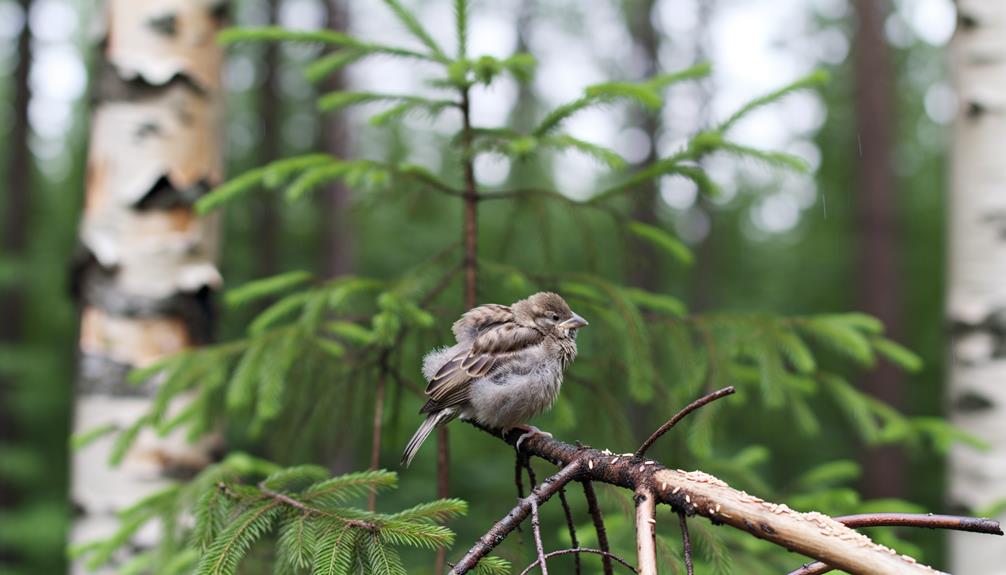
Stress factors play a critical role in a fledgling sparrow's refusal to eat, often exacerbating underlying health issues. Environmental changes, such as relocation or exposure to unfamiliar stimuli, can induce significant stress. Predatory threats, both real and perceived, trigger heightened vigilance, detracting from feeding behavior.
Additionally, improper handling or confinement can lead to acute stress responses. Physiologically, stress elevates cortisol levels, adversely affecting appetite and digestion. Social stressors, such as separation from parents or siblings, further compound the issue.
Recognizing these stressors is paramount for effective intervention. By identifying and mitigating stress-inducing factors, caretakers can create a conducive environment that promotes recovery and encourages feeding, thereby improving the sparrow's overall health and wellbeing.
Handling With Care
Proper handling techniques are essential for mitigating stress and encouraging feeding in fledgling sparrows. Ensuring minimal distress during interaction is pivotal for fostering a conducive environment for feeding.
Key handling practices include:
- Gentle Touch: Use a soft grip to avoid causing physical harm or undue stress.
- Quiet Environment: Maintain a calm, low-noise setting to prevent startling the bird.
- Limited Handling: Restrict handling to necessary instances to reduce anxiety and energy expenditure.
Each of these methods contributes to the overall well-being of the fledgling, potentially enhancing its willingness to eat.
When to Seek Help
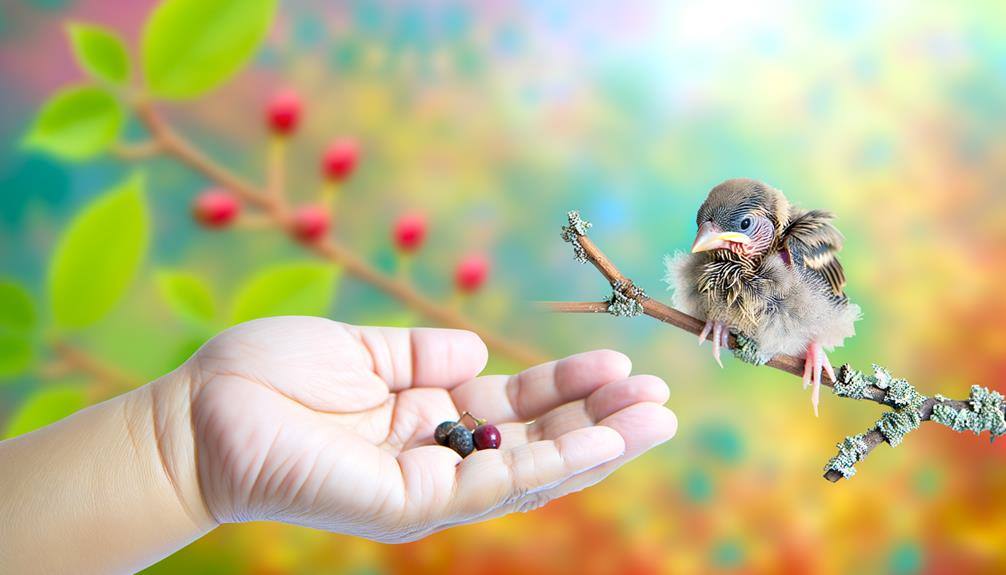
Despite careful handling, there are instances when professional intervention becomes necessary to ensure the health and survival of a fledgling sparrow. Especially, if the bird exhibits prolonged refusal to eat, lethargy, or visible signs of illness such as discharge from the eyes or beak, immediate consultation with a licensed wildlife rehabilitator or avian veterinarian is essential.
Additionally, abnormal respiratory patterns or severe weight loss warrant prompt expert evaluation. Immediate intervention can prevent complications and provide specialized nutritional and medical support. Documenting the bird's behavior, dietary attempts, and any symptoms will assist professionals in diagnosing and treating the underlying issue effectively.
Timely expert assistance significantly improves the likelihood of recovery and successful reintegration into the wild.
Long-Term Care Strategies
Long-term care strategies for a young sparrow require a detailed understanding of its nutritional needs, habitat requirements, and behavioral development. A thorough approach involves ensuring the bird receives appropriate care to thrive.
Key considerations include:
- Nutritional Requirements: Providing a balanced diet rich in proteins, vitamins, and minerals tailored to a sparrow's growth stage.
- Habitat Requirements: Creating a safe, stimulating environment that mimics natural conditions, ensuring proper temperature, humidity, and space for movement.
- Behavioral Development: Encouraging natural behaviors through interaction and environmental enrichment, promoting physical and mental well-being.
These strategies necessitate continuous monitoring and adjustment to address the evolving needs of the sparrow, ensuring its successful advancement to independence and overall well-being.
Conclusion
To summarize, fledgling sparrows refusing to eat can be attributed to various factors, including illness, environmental stressors, and improper feeding techniques.
It is essential to monitor their health closely and provide a suitable diet to guarantee proper growth and development.
Remarkably, a study found that up to 40% of fledgling bird mortality is due to inadequate nutrition, highlighting the importance of addressing feeding issues promptly.
Seeking professional advice when needed can greatly enhance survival rates.

